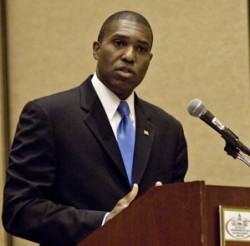Chamber of Commerce Finds Common Ground with DOJ on Key Litigation

Tony West. Photo by Jayms Ramirez
Charles Dickens opened his famous novel A Tale of Two Cities with “It was the best of times, it was the worst of times.”
If Dickens were covering an ABA Annual Meeting program Friday that looked at where the civil division of the U.S. Justice Department stands in the eyes of some groups that regularly disagree with the Obama administration, he might have to modify that famous lede to say: “There are some good times, and the worst of times aren’t as bad as they might seem.”
That was the message conveyed by Gregory Katsas, who headed up the civil division during the George W. Bush administration, and Robin S. Conrad, who heads up the litigation arm of the U.S. Chamber of Commerce, which often has been at odds with the Obama administration on economic issues.
Katsas and Conrad offered their perspectives after Tony West, the current assistant attorney general heading up Justice’s civil division, outlined the division’s priorities and efforts to address them. He said the division’s three top priorities are protecting the American people, primarily through its handling of terrorist detainee cases; fighting waste and fraud in areas like health care services and government procurement; and consumer protection, which is getting more attention from the Justice Department as the recession drags on.
“But,” West said, “events will hijack your agenda.” As proof, he described the civil division’s role in leading the Justice Department’s handling of legal issues stemming from the BP oil spill in the Gulf of Mexico. In particular, he said, “Our job is to ensure that not one cent of public dollars go to cleanup costs.” He noted that the civil division also is leading the federal government’s challenge to a controversial immigration law in Arizona.
Offering the perspective of the business community, Conrad, who is executive vice president of the National Chamber Litigation Center in Washington, D.C., said that at least on the litigation front, the chamber and the Obama administration do share a number of concerns, including the importance of fighting fraud and even some immigration issues.
“We are not always at odds with the civil division,” said Conrad at the program, which was sponsored by the ABA Section of Administrative Law and Regulatory Practice. “It’s a case-by-case thing. The chamber will agree when it can agree, and will disagree when it must.”
One current area of disagreement is dealing with the Gulf oil spill, said Conrad. She said the drilling moratorium announced by the administration after the leak in April was “hasty and ill-conceived.”
For his part, Kotsas, now a partner at Jones Day in Washington, D.C., said the civil division has continued to follow a number of positions introduced during the Bush administration in litigation regarding the status of terrorism detainees. “What we’re seeing,” Kotsas said, “Is a continuity between the positions we took and the position’s Tony’s team has taken.”



